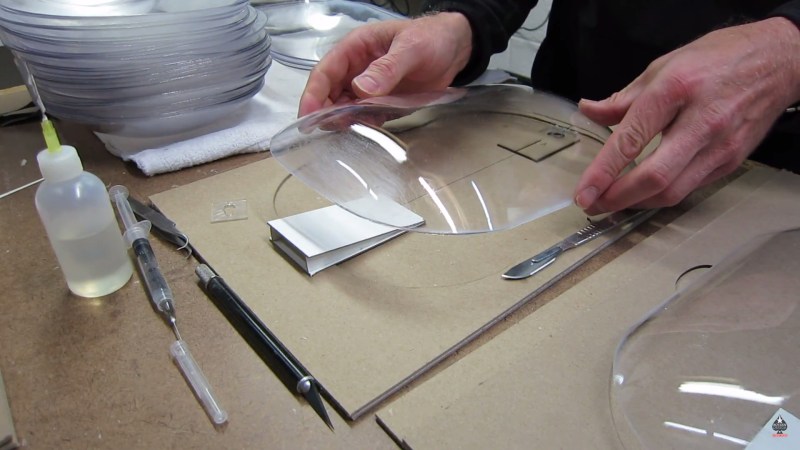We build things we think are cool. Sometimes, other people agree with us and they want a copy of what we’ve built. If you’re lucky enough to have an enviable product but you’re not ready for full-scale manufacturing, you may be looking at a low-volume production run. [Eric Strebel] walks us through one such instance where he makes some custom color swatches for a show. Video after the break.
[Eric Strebel] is an industrial designer so he plays to his strengths by designing the swatch shape, jig, tool, and hangers. He hires out the painting, laser cutting, and CNC machining. This may seem like a simple statement but some of us have a hard time paying other people for things we’re capable of learning. In some cases, we just have to pay the professionals to do it correctly and keep our focus.
The mentality of small runs in this video is perfect for people who sell on Tindie or want to make more than a handful of consistently nice parts. Our own [Lewin Day] recently talked about his experience with a run of 200 mixers called gMix.
















For me, the challenge isn’t volumes of 3 digits or 1 digit, it’s two digits.
My GPSDO products do well for me, but OCXOs are ~$100 each, so 100 of those alone would be $10k – I can’t afford that kind of capital outlay.
So right now, they’re all individually hand-made because I can’t reasonably get a manufactured batch of, say, 25 of them made. And 25 of them is something like 1-2 years’s worth of production (at the moment).
China Thunderbolt clones are $150 delivered – you chose wrong – don’t convince yourself it is a business, and don’t make things for bums.
To paraphrase Bill Murray in Quick Change, “I want to thank you. You could have been helpful, but you’ve been so much more.”
WINNING COMMENT OF THE DAY :D
And tea futures are $7.35 per bushel. But I don’t see how any of that is relevant to the topic at hand.
Selling hardware that has no market traction only further fractures a nonviable market sector. Or more simply, supply and demand economics should control your pricing structure — if not, than you are only damaging yourself and other peoples livelihood. https://en.wikipedia.org/wiki/Rational_egoism in not a profit mode, and has destroyed countless trade economies.
Other examples:
* if engineers work for free, than their trade becomes worthless
* if artists paint for free, than they will starve a hapless fool
* if programmers work for free, than their opportunity to benefit from such skills is bid down
* if everyone is a bandit, than the potential value of being a bandit is bid down
* low barrier tech markets with low hanging fruit will spoil more quickly with increased supply sources (not necessarily inventory)
If there is some other form of exchange in value like FOSS, than this does not apply — in my opinion the only counter argument in history, and the jury is still out as cultural trends shift over time.
So … if someone spends time with you for free, it’s worthless?
@LOL THEN THEN THEN THEN. Holy crap dude.I know, I know. Next you’re going to tell me that English isn’t your first language.
>”So … if someone spends time with you for free, it’s worthless?”
No. It’s priceless.
Folks, don’t waste your time clicking the first link. It’s a link to the same embedded YT video.
And the youtube video doesn’t describe at all what his product is or why he made it, but does take the time to repeatedly beg people to subscribe/follow him in various ways.
It also doesn’t really offer the slightest advice on “producing more than one offs.” It’s just “here’s in VERY general terms how I made this mysterious thing.”
The “product” he made was a generic swatch and he then made lots of them (multiples of each colour).
The only thing I can see that made what he did which made it low-volume was the manual process of affixing the hanging tab – beyond that it was practically a very scalable process (the next step would have been to form & cut the shapes in one go and maybe mechanise aspects of securing the hanging tab). However he didn’t really describe his reasoning or ‘gotchas’ in scaling up production, it was simply a video of a thing he was contracted to make and he chose a process from those requirements (there was no evolution of the process, just an example of mid-volume production).
For me “swatches” = https://cnet3.cbsistatic.com/img/Kw2BXjr7eIzFdYjt67364o_GQ9c=/1600×900/2015/03/13/75932192-cfff-4ede-bfc0-1114532a9c23/swatch-creart.jpg
For me, “swatches” =
https://i.imgur.com/ZyebJ00.jpg
now i’m crying.
Unfortunately, being capable of learning means you don’t expect he professionals to do as good a job as you could…
Or, you think you can do a “Good Enough” job and are willing to invest time to learn a new skill,
or simply have more time than money to invest.
“Anything worth doing, is worth doing badly.”
G.K. Chesterton